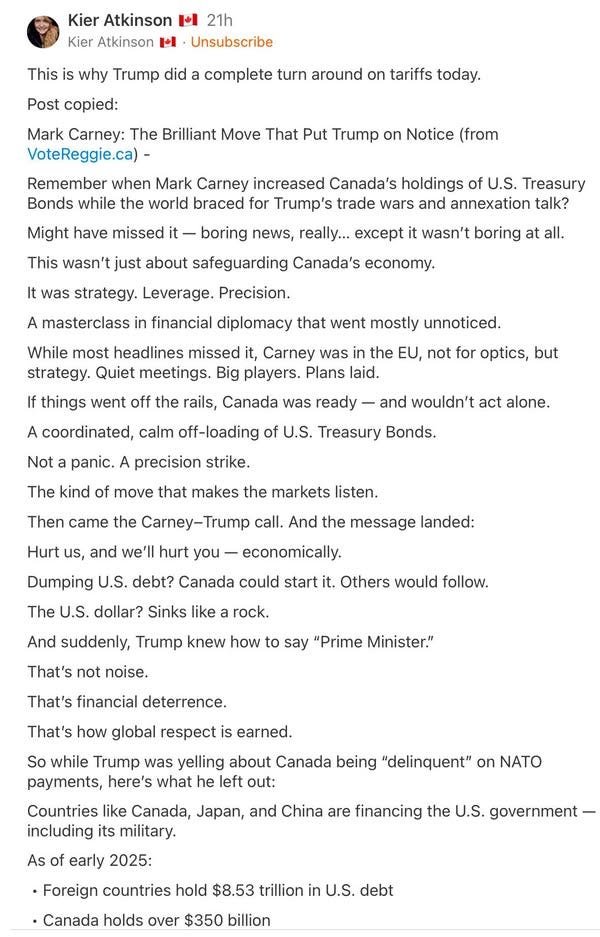No, Mark Carney Didn’t Sell Off U.S. Treasuries To Ambush Trump. He Sold Credibility.
No coordinated bond dump. No economic sabotage. Just disciplined diplomacy and a Prime Minister who understands how global markets really work.
A viral post is making the rounds claiming that Mark Carney orchestrated a behind-the-scenes financial ambush—offloading U.S. Treasuries to pressure Donald Trump into backing off tariffs. It’s dramatic, and it flatters the idea of Canada as a shadow economic superpower. But as with many good stories that travel fast online, this one collapses under the weight of basic facts, institutional reality, and how global finance actually works.
This makes for a dramatic story, but the facts don’t support the idea that Carney, Japan, and the EU launched a coordinated Treasury bond offensive to force Trump to back down.

There’s no credible evidence that any of these countries actively sold off U.S. debt in a strategic maneuver. In fact, Japan’s finance ministry publicly ruled out using its Treasury holdings as leverage.
And Canada? If anything, we’ve been gradually managing risk away from the US… more likely letting Treasuries mature without reinvesting—a quiet, conventional move that doesn’t go thermonuclear on markets.
It’s also important to remember: a Prime Minister can’t just invoke monetary policy. In Canada, that authority lies with the Bank of Canada, which operates independently from the federal government. Carney brings global credibility from his time at the Bank of Canada and Bank of England, but he’s not directing bond purchases or sales from the PMO.
On top of that, I’ve seen more than once that people are conflating two entirely separate things.
First, the U.S. dollar–denominated global bond Canada issued earlier this year—that wasn’t a signal of dumping U.S. debt. It was a smart move to strengthen Canada’s foreign reserves, diversify liquidity, and hedge against FX volatility. It’s good fiscal strategy, not financial warfare, and this one you can likely credit to Carney.
Second, some are misreading broader market shifts—the bond sell-off in the U.S. triggered by inflation, deficit concerns, and global rate volatility—as if it reflects Canada liquidating U.S. Treasuries.
That’s just not what’s happening.
There’s a difference between sovereign diversification across multiple countries and a targeted, state-driven sell-off as leverage.
What actually happened is more sophisticated—and more effective.
Carney didn’t need to weaponize financial markets.
He brought disciplined diplomacy, coordinated pressure, and the backing of key allies.
SIDEBAR: Why Did Trump Stop Calling Canada the “51st State”?
Because Carney didn’t play the game—he rewrote the rules.
Trump’s “51st state” jabs once landed as trolling. But then they stopped. Why?
Here’s what changed:
1. Carney went public—carefully.
In London, he didn’t lash out. He said, “We don’t need another country to define our sovereignty. We are sovereign.” That message, backed by allies, reframed Canada not as a junior partner—but as a peer unwilling to be patronized.2. Canada coordinated quietly.
While Trump blustered, Carney lined up quiet trade countermeasures and locked in diplomatic support from France, the UK, and the EU. This wasn’t sabre-rattling—it was strategic alignment.3. The economic undertones shifted.
Speculation that Canada and others might diversify away from U.S. Treasuries spooked markets. Carney didn’t fan those flames—but he didn’t need to. The perception of a shift was enough to make Washington take notice.4. The optics turned.
Carney's calm credibility made Trump’s rhetoric look unserious. Business leaders and international observers weren’t laughing anymore. Trump’s line wasn’t just tired—it was starting to cost him.5. There was no chaos to feed on.
Trump thrives in disorder. Carney gave him none. No name-calling. No drama. Just steady, institutional strength. And in that vacuum, Trump’s punchlines started to fall flat.Bottom line?
Carney didn’t clap back. He boxed Trump in—with poise, preparation, and pressure. The result was silence.
The real shift came from a unified front: retaliatory tariffs ready to go, firm messaging from Europe, and a Canadian PM who made it clear that respect for sovereignty was non-negotiable.
You can even see it in his public posture. In the attached clip, Carney references close coordination with the UK and France while speaking calmly about “resilience” and “economic security.”
That’s not off-the-cuff language, it’s the vocabulary of economic statecraft. The kind that signals strength without destabilizing markets.
He wasn’t threatening Trump. He was boxing him in with credibility, not chaos.
So no—this wasn’t a Treasury bond ambush. It was diplomacy done right. Quiet. Strategic. And impossible to ignore.
And for that we should give Carney full marks.





